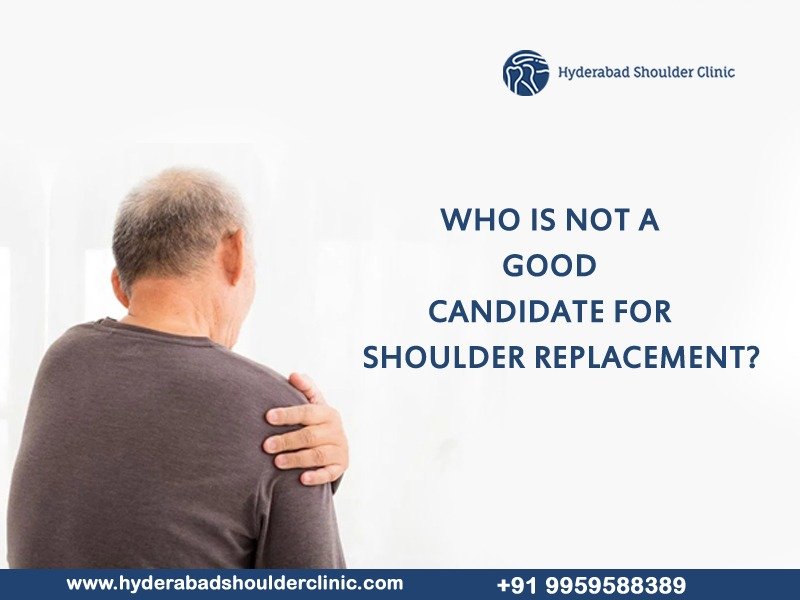Shoulder pain disrupts daily life, especially if it lasts for a long time. Patients experience stiffness, numbness, and pain in their shoulders due to their jobs, particularly if it involves hard physical labour. But there might be underlying medical conditions also causing the pain, and the doctors can confirm this through a variety of diagnostic tests.
Joint replacement surgeries are helping patients worldwide by relieving their pain and allowing them to lead active lifestyles. Out of all the replacement procedures, shoulder replacement surgery is the fastest-growing one. In the USA alone, over 70,000 surgeries take place each year. Though there are unique challenges, the overall procedure has a high success rate. The success could be less under a few conditions, and patients should follow some restrictions. On any day, the best way to know if you can undergo shoulder replacement surgery is through direct consultation with your surgeon.
When is one suggested to undergo shoulder surgery?
A good doctor always suggests conservative methods, which may include:
Lifestyle changes: Observing and avoiding activities contributing to shoulder pain.
Over-the-counter medications: Doctors will prescribe anti-inflammatory drugs and cortisone injections.
Physical therapy: Long-standing and regular physical therapy may help alleviate pain and improve the state of a patient’s shoulder.

In case the patient can no longer manage advanced osteoarthritis with conservative treatments. If pain management can no longer control symptoms, joint deterioration is likely. Hence, replacement surgery is recommended.
The following are reasons to undergo shoulder replacement surgery:
Osteoarthritis: Osteoarthritis is a condition where the cartilage wears out, resulting in bones rubbing against each other. It is more common in elders and causes inflammation and pain.
Rheumatoid arthritis: RA is an autoimmune inflammatory disease that damages the joint cartilage, leading to joint pain and inflammation.
Traumatic arthritis: Arthritis does not always occur due to disease or wear and tear. It could result from physical trauma, such as a car accident or a sports injury, and may take months to heal.
Osteonecrosis: The bone tissue dies due to a lack of blood flow in the area. Bone collapse affects the nearby tissues in the shoulder.
Previously failed shoulder replacement: if an earlier shoulder replacement surgery did not heal correctly. A failed surgery causes misalignment of the joint and other complications.
While these methods are enough for minor shoulder pain, some conditions are too severe to effectively treat with conservative treatments.
Who is not a good candidate for shoulder replacement?

One should have good overall general health. The patient’s age and body weight increases the risk of complications, so your surgeon factors these into your treatment plan. The factors below do not completely mean you are excluded from surgery. It’s just that they can reduce your chances of a successful procedure and healing. But if a person has more than one of these factors together, then surgery is no longer recommended.
Smoking: If one uses tobacco and nicotine products, there are ten times more chances of getting a revision surgery after joint replacement surgery. These products hinder blood flow, a key part of healing and recovery. If the patient is serious about the surgery, they should reduce the intake or quit before being approved.
Infections: An infection in the body can make surgery risky, so pre-existing infections may postpone your shoulder replacement.
Osteoporosis: For a person with this condition, the bone density reduces, so the bonding between bone and the shoulder prosthetic won’t be strong. For those with mild or moderate osteoporosis, minor changes to the surgery could improve success rates.
Shoulder damage: if a person has damaged shoulders, such as deterioration of the socket on the inside of the shoulder blade, severe damage to the rotator cuff, or damage to the deltoid muscle, replacement surgery may not be recommended.
Nerve damage: if the nerves connecting the spinal cord and the shoulder, arm, or hand are malfunctioning, then surgery is ruled out. Also, people with epilepsy or dementia may not be good candidates for shoulder replacement.
We at Hyderabad Shoulder Clinic assess the patient’s physical condition before recommending surgery. If the patient has any pre-existing conditions such as diabetes, hypertension, asthma, cardiac issues etc., we will assess their suitability for the surgery. Smokers and alcoholics are given time to control these habits as they will interfere with post-surgical recovery. Please visit our website https://hyderabadshoulderclinic.com/ to know more about us or contact us at +91 9959588389, shoulderandsportsclinic@gmail.com





